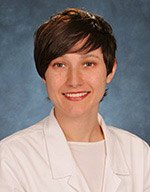
March 01, 2017
Having graduated from medical school in 2008 and Internal Medicine residency in 2011, I am a physician-child of the Affordable Care Act era. The belief that “health care is a human right” ran deep through my upbringing and life experiences, but training during a period of such intense debate over health care reform reinforced this ideal. My professional identity developed interwoven with a compelling national conversation about access and improvement.
Though the ACA has much to debate in the details, the dialogue of my medical coming-of-age was rooted in the quest for quality, sustainability and equity.
I work as a hospitalist in an academic medical center.
Dr. Rebecca Jaffe
He had amassed almost a decade of medical data spanning at least three health systems, marred with interruptions, false starts and redundancies.
From hematologist to gastroenterologist, over a wide swath of time and space, we physicians agreed that he had real pathology underlying his pain. The true cause, though, remained frustratingly elusive – a web of workup that refused to come completely into focus. For my team, though, time was running short. Our patient was "too healthy" to stay in the hospital for much longer.
The ACA created opportunities for patients like this to gain coverage and connect with primary care. It incentivized physicians to build longitudinal care plans for patients "too healthy for the hospital," but too sick to thrive outside.
It also compelled a narrative centering on how we as a medical community might innovate in the care for the individuals most at risk for this insidious ebb and flow between well and ill, engaged and adrift. What does it feel like to practice without the underlying assumption that the nation cares about your patients? For me, it feels like abandonment.
To paraphrase Dr. Martin Luther King Jr., I used to trust that the arc of health care reform 'bends toward justice,' but today I’m not so sure.
As a physician raised to equate health and justice, it goes against my nature to see someone like my current patient and proclaim "I don't know who can help you but you can't stay here." Who if not me will make him whole?
And what will result from a resolute personal stance to put the patient first? Unfortunately, I fear we will see increased health care spending due to inpatient evaluation for chronic conditions, and unnecessarily long hospital stays while we wait for workups. Both will remain unmatched by any improvement in patient outcomes to justify the expense, as we continue to discharge vulnerable individuals without a safety net in place.
In short, we will see the status quo we've been desperate to leave behind. Sadly, one factor leading to this waste will be dedicated physicians struggling to accomplish the impossible task of fixing people from within a broken system.
To paraphrase Dr. Martin Luther King Jr., I used to trust that the arc of health care reform “bends toward justice,” but today I’m not so sure.
I feel my approach to practice begin to shift. The pivot is subtle, but involves a new paranoia – that individual providers, seeing the ravages of chronic disease combined with poor access to care, are the last line of defense.
As hospitals strive to decrease costs and improve efficiency, and the nation draws back from its commitments while toying with the idea that health is a luxury only for the wealthy, I feel myself digging in my heels.
I am standing beside my patient, with every intention to do right by him.
• • •
Rebecca Jaffe, M.D. is a physician and clinical assistant professor at Thomas Jefferson University Hospital in Center City Philadelphia.
 Jefferson Health/.
Jefferson Health/.